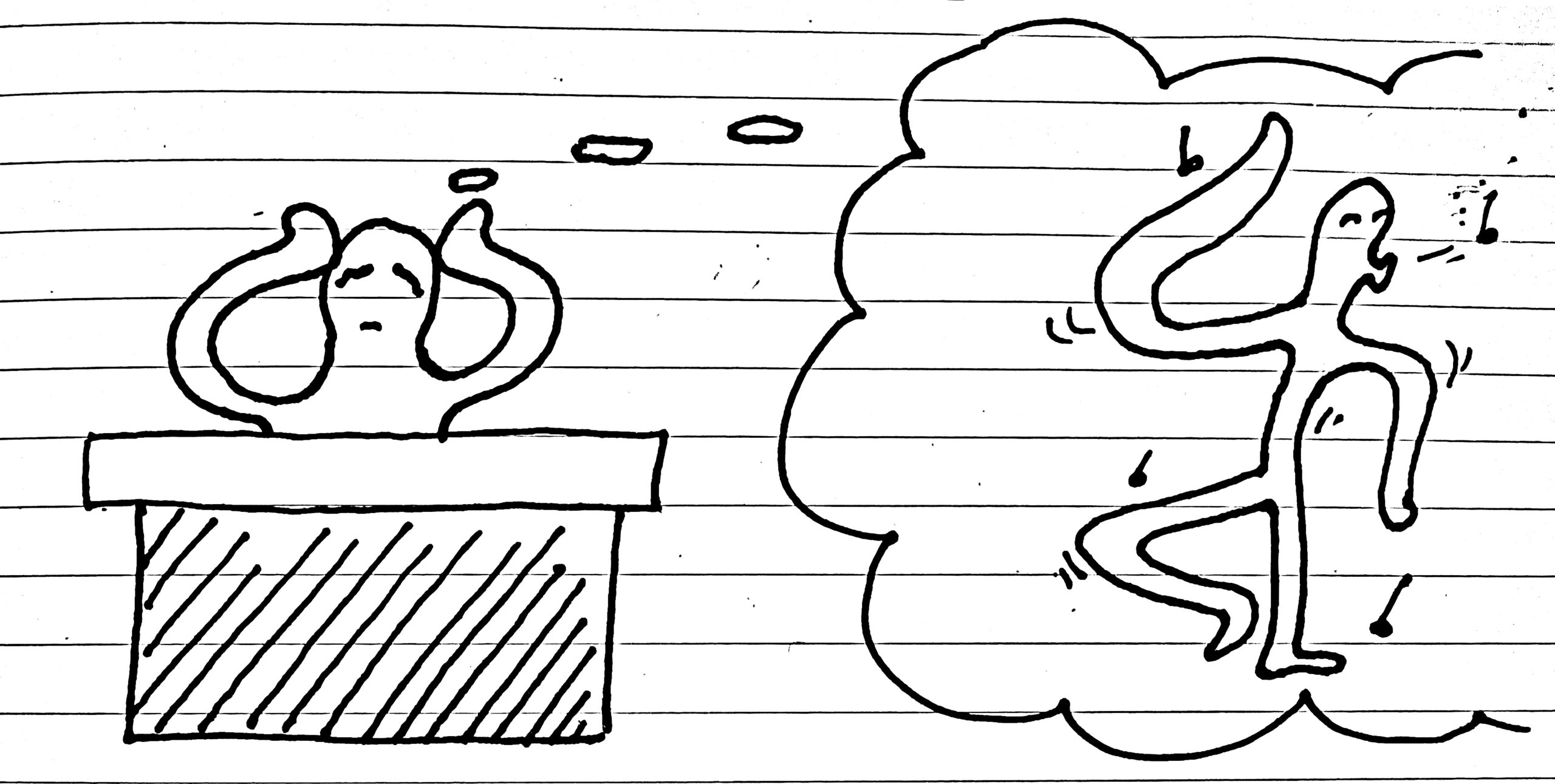Artists Working as Arts Administrators
The Complicated Nature of Careers in the Arts

The following is an excerpt from Art and Survival, a weekly-ish newsletter documenting this theatre-loving boy’s attempt to build a secure life filled with creative acts. You can find out more in the introductory post here.
This week: a meandering reflection on whether or not artists should work as arts administrators.
During my second month working a full-time job fresh out of college, I read a chilling quote that haunts me still.
I believe administration is an art form but if you’re an administrator who really wants to do a different form of art, you should quit your administration job, do that other art, and make room for administrators to take your job who actually love what they do. Because I believe there is nothing better than working with someone who loves what they do…
–Taylor Mac, in I Believe: A Theatre Manifesto
I am an administrator. And I am an artist.
When I was in an undergraduate program at Boston University’s College of Fine Arts, I noticed – but did not deeply consider – that little time in class was given to the business side of the arts industry. This is probably for the best. Art catered toward capital gain is content, and I prefer art that centers music and beauty and thought.
BU’s CFA once sent an email including interviews with a few students about their summer internships, and I remember getting stuck on something a music student said about what he learned working in marketing for a symphony.
This experience in arts administration opened my eyes to the professional possibilities in the music field.
This gave me pause. Was the student giving up on music? Was he going white-collar? Should I do that?
In college, whenever a viable path presented itself – a clear path with stones showing me where to place each foot – I was ready to follow it. The thing is, there is no clear path for creative people to follow. It’s up to us to treat our lives like our art, to bring our unique electricity and rigor and creative-problem-solving to bear within our lives. We have the skills to do this. What’s stopping us?
Just after school, after taking a course called Career Development in the Arts, I landed an internship with Concord Theatricals, a theatre publishing and licensing company. The internship – in the literary department – lead me towards a full-time job in the company’s marketing department, thanks to an outspoken manager. Working there, I learned, as the music student did, that steady careers in the arts exist. Careers – not jobs – where one is genuinely valued and can survive without worrying about their next gig, or their next paycheck.
If the artist can escape the scrabble of financial panic and “how the f am I gonna pay rent this month,” perhaps space opens up for more work. While working in marketing, I wrote my first full-length play, and with the help of supportive friends and intelligent collaborators, the play was staged at a queer fringe festival in New York City.
Between the literary internship and the marketing coordination, I spent about 18 months with Concord. The first paycheck I got – at my $15/hr intern rate – blew my mind.
This paycheck, however, came with a subtle cost. I’d sold my time. I was wearing golden handcuffs. And let’s be real here: these were $48,000/year gilded handcuffs, not the nice 24-carat cuffs that come with Some Other Jobs in Tech or Finance.

Arts administrators generally experience the art through the filter of emails, website copy, and in marketing’s case, social media content, and this measures out a certain distance between the administrator and the art. For someone who is called to administration, this is good; there needs to be someone minding the payroll, getting the word out, and coordinating everyone’s schedules. In live performance art, we need to be in a room together in order to work, and we eventually need spectators. Arts administrators help get the artists in the room and the spectators in front of the artists. Someone has to do that.
(Office hours with my astrophysics professor.) ME: But professor – why astrophysics? PROF: Someone has to keep track of what’s going on out there.
Someone has to administrate to make theatre happen and to get writers, actors, directors, designers, and musicians paid.
Artists want that administrative support, and we want it to be good. The writer wants to benefit from the publisher’s marketing. The artist-administrator may play a part in making the marketing they know the artist wants, but if they really want to be beneficiary of the marketing they’re doing, their days may become filled with longing – that longing to do the art, rather than act as art’s accomplice.
…I recognize that sometimes I hate what I do and that the grumpy people around me may be just going through one of the those hate-phases as well and to give them a break.
–Taylor Mac, in I Believe: A Theatre Manifesto
Even filled with longing – and who does not feel longing? – artists can make great administrators because of their unparalleled passion for their art. They know exactly what kind of support will serve the artist best. Unfortunately, this passion can be co-opted.
Artist-administrators are often underpaid for their work, as companies are either a) broke because the USFG doesn’t fund the arts too good or b) sneaky and know that they can get talent for cheap because hardworking multifaceted people want to be close to the art. An old section in Lauren Halvorsen’s delightful theatre substack, Nothing for the Group, documented the salary posted on job listings in the theatre industry compared to area living wage, and most positions were paying about $10k under that bare-minimum.
The disparity between listed salaries and living wages in non-profit American theatre reveals a greater injury in the American arts ecosystem. Let’s think about how money reaches artists in this country:
- In lieu of government funding for the arts, non-profit arts organizations fight for individual donations and big philanthropic foundation grants. They’re in a Darwinian race for their lives. Institutions trying new models – unless those models work right away – probably won’t survive. Established institutions will.
- In this American environment of limited funds, the foundations that pay out large awards generally do so to organizations with a proven track record.
- Artists need to be contracted by institutions in order to access that foundation funding.
- Historied organizations prefer to work with people they already know. This is great for artists who are on multiple organizations’ nice lists, but makes it especially hard for emerging artists to get discovered.
If a skilled and tenacious artist has yet to be discovered, and loves their art form more than anything else, they may turn toward administration as a way of surviving while staying connected to the form. And thus we have the artist-administrator.
I think there’s a misconception that artist-administrators – and sometimes this is extended to arts-educators – are “failed artists.” But what does that mean? What actually is a failed artist? An unknown artist? The few artists who do pierce a part of collective consciousness are propelled and supported by the artistic research of thousands who came before them. A failed artist, to me, is one who does not labor over art, and does not play. A successful artist makes.
I opened this piece with a quote from Taylor Mac. If you aren’t familiar with their work, you can visit their website to learn more about their gender-expansive, almost-mystical performance aesthetic. The quote is part of a longer manifesto Mac wrote about theatre, and it’s really beautiful and def worth a read. They’ve removed it from their website, but it’s documented on Hannah’s Theatre Collage, a Tumblr page. Thanks, Hannah.
I resonate with so many pieces of Mac’s manifesto, especially this part:
I believe in surprise and that if you want to remind your audiences of the things they have dismissed, forgotten, or buried, then you need to surprise them.
I believe, in the theater, something surprising should happen every ten seconds.
The whole point of writing a manifesto, I think, is to believe in something fully, even if only for a few minutes. That firm belief can spark conversation around the manifesto’s underlying aesthetic vision.
So, to add to the conversation Taylor Mac began: I think artist-administrators should not quit their jobs. I want artists to survive, and I don’t really care how they do it, as long as they breathe and make work.
I agree with Mac that administration is an art, and that the best arts administrators are people who want to administrate and only administrate, and who love caring for the arts through their ministrations. I was trained for my current job in company management by a bookkeeper who gave me goosebumps during our video calls because of their raw passion and knowledge around keeping non-profit theaters organized.
I think that we need good people to be administrators, and if they’re also artists, then that’s one more artist an institution is supporting. Plus it’s probably a good thing to have artists who understand arts-as-business, because the economics of art-making are unescapable.
In The Arts Management Handbook, the authors open by describing how Shakespeare and Michelangelo engaged in both artistry and administrative activity:
Not only did [Shakespeare] write the plays his actors performed; he also ran rehearsals, wrote playbills to promote his productions and distributed them throughout London, designed his theater, and recruited and contracted actors…he was involved in almost every aspect of his theater’s existence.
If we really want art to appear, then we all need to work however we can to make art happen.
So, if an artist is able to eat and create thanks to an admin job – or any other 9-5 or 10-6 that gives them enough room – maybe that’s a good thing. And maybe that artist-administrator will see something somewhere that really lets them shake up the model we’ve been using to stand up artwork and support artistic labor under capitalism.